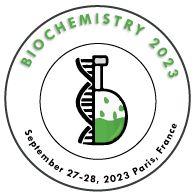Biochemistry for Material Science:
Complexes, proteins, and catalysis through a series of case studies, reveals recent advancements in the discipline of biochemistry, allowing materials scientists to take use of these breakthroughs for innovation in their own field, from the design of bio-inspired materials to the use of cutting-edge catalyst classes. A look at various biochemical materials, a discussion of the fundamental concepts and methods of biochemistry, an investigation into the fields of bioscience, chemistry, and inorganic-related materials, and an introduction to seven recent discoveries are all included in the course Biochemistry for Material Science. Cosmo chemistry is discussed in the book's epilogue.
Related Conference of Biochemistry for Material Science:
Biochemistry for Material Science: Conference Speakers
Recommended Sessions
- Medical Genetics:
- Nutritional and Clinical Biology:
- Pharmaceutical and Medicine Biochemistry:
- Protein and Analytical Biochemistry:
- Biochemistry for Material Science:
- Cardiovascular Biochemistry:
- Chemical Biology and Computational Chemistry:
- Clinical Pathology:
- COVID 19 and Biochemistry:
- Enzymology and Biochemistry:
- Enzymology in Molecular Biology:
- Lipids and Metabolism:
- Molecular and Cellular Biology:
- Molecular and Structural Biochemistry:
- Molecular Biology and Material Science:
- Molecular Virology:
- Nano Biochemistry:
- Pharmacology and Toxicology:
- Plant Animal Biochemistry:
- Structural Biochemistry:
- Structural Molecular Biochemistry and Structural Bioinformatics:
- Study of a set of proteins in Biochemistry and Molecular Biology:
Related Journals
Are you interested in
- 3D Structure Determination - Structural Biology-2026 (France)
- Advanced Drug Delivery Systems for Metabolic Therapy - DRUG CHEMISTRY CONF 2026 (France)
- Advanced Techniques in Structural Biology - Structural Biology-2026 (France)
- AI & Computational Structural Biology - Structural Biology-2026 (France)
- Biochemistry and Biophysics - Structural Biology-2026 (France)
- Biomarker-Guided Drug Development - DRUG CHEMISTRY CONF 2026 (France)
- Chemical Biology Tools in Metabolic Research - DRUG CHEMISTRY CONF 2026 (France)
- Computational Approach in Structural Biology - Structural Biology-2026 (France)
- Computational Drug Design and Molecular Modeling - DRUG CHEMISTRY CONF 2026 (France)
- Drug Designing and Biomarkers - Structural Biology-2026 (France)
- Drug Resistance and Therapeutic Durability - DRUG CHEMISTRY CONF 2026 (France)
- Enzyme Modulation Approaches in Antidiabetic Drug Design - DRUG CHEMISTRY CONF 2026 (France)
- Epigenetic Regulation and Small-Molecule Therapeutics - DRUG CHEMISTRY CONF 2026 (France)
- Future Directions in Drug Chemistry for Diabetes Management - DRUG CHEMISTRY CONF 2026 (France)
- Hybrid Approaches for Structure Prediction - Structural Biology-2026 (France)
- Lipid Chemistry and Metabolic Regulation - DRUG CHEMISTRY CONF 2026 (France)
- Medicinal Chemistry Strategies for Metabolic Disorders - DRUG CHEMISTRY CONF 2026 (France)
- Membrane Proteins and Receptors - Structural Biology-2026 (France)
- Molecular Modelling and Dynamics - Structural Biology-2026 (France)
- Natural Product Chemistry in Diabetes Drug Discovery - DRUG CHEMISTRY CONF 2026 (France)
- Oxidative Stress Modulation through Drug Chemistry - DRUG CHEMISTRY CONF 2026 (France)
- Peptide and Protein-Based Drug Chemistry - DRUG CHEMISTRY CONF 2026 (France)
- Pharmacokinetics and Drug Metabolism Studies - DRUG CHEMISTRY CONF 2026 (France)
- Prodrug Design and Chemical Activation Strategies - DRUG CHEMISTRY CONF 2026 (France)
- Proteomics and Genomics - Structural Biology-2026 (France)
- Regulatory Chemistry and Drug Safety Assessment - DRUG CHEMISTRY CONF 2026 (France)
- Structural Bioinformatics and Computational Biology - Structural Biology-2026 (France)
- Structural Biology in Cancer Research - Structural Biology-2026 (France)
- Structural Virology - Structural Biology-2026 (France)
- Structural Virology and Infectious Diseases - Structural Biology-2026 (France)
- Structure-Based Drug Discovery - Structural Biology-2026 (France)
- Structure-Based Solutions to Global Health Challenges - Structural Biology-2026 (France)
- Structure-Function Relationships - Structural Biology-2026 (France)
- Structure–Activity Relationship Studies in Drug Chemistry - DRUG CHEMISTRY CONF 2026 (France)
- Synthetic Chemistry Innovations in Drug Development - DRUG CHEMISTRY CONF 2026 (France)
- Targeting Pancreatic Function through Drug Chemistry - DRUG CHEMISTRY CONF 2026 (France)
- The Structural Basis of Disease - Structural Biology-2026 (France)
- Translational Drug Chemistry from Bench to Clinic - DRUG CHEMISTRY CONF 2026 (France)

